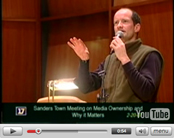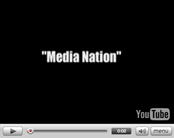How Copyright Confusion Impacts Media Literacy
Following on the release of their 2005 "Documentary Filmmakers' Statement of Best Practices in Fair Use," the Center for Social Media and the Washington College of Law at American University teamed up with Temple University's Media Education Lab to present a new report this fall on "The Cost of Copyright Confusion for Media Literacy." The report hopes to bring together media literacy educators at the national level "to develop a code of practices" to articulate how fair use applies to their work (from the press release).
The study included interviews with "63 educators from K-12, university and college professors, and youth media professionals." The project's Co-Principal Investigators, Renee Hobbs, Peter Jaszi, and Pat Aufderheide reveal many different responses from educators about what they believe they can and can't do under copyright law. Among other things, they found
"Teachers use less effective teaching techniques, teach and transmit erroneous copyright information, fail to share innovative instructional approaches, and do not take advantage of new digital platforms."
Furthermore, the report shows that conservative statements on copyright policy created by academic institutions have created a culture of fear among educators that have made it difficult to use copyrighted material in the classroom. There are a number of cases in the report that exemplify this fear, including one that from a university professor who stopped "putting video clips of copyrighted material online," even behind closed-walled (password-protected) course management systems because of "concerns about copyright violation."
The Cost of Copyright Confusion reveals that the "pedagogical costs of studied ignorance, quiet transgression, and hyper-compliance are many." In its conclusions and recommendations, the report states that media literacy educators need to take the first step and educate themselves "about the clear and unambiguous use rights" that copyright law provides. Second, the report shows
"There is an urgent need to develop and disseminate a code of practice for fair use of copyrighted material by media literacy educators, based on collective discussions about the ways in which educators actually do and reasonably could use such materials, consistent with the law."
On October 26, I was fortunate to have had the opportunity to attend a meeting in Boston with Renee Hobbs and Peter Jaszi, along with a small group of media educators, media producers, librarians and others in this effort towards building a "code of practice." I look forward to following the progress of their work. When released, this statement of best practices should be an invaluable contribution to media literacy education in the digital age.
[Link to original post]



![View your cart items []](/sites/default/modules/ecommerce/cart/images/cart_empty.png)




